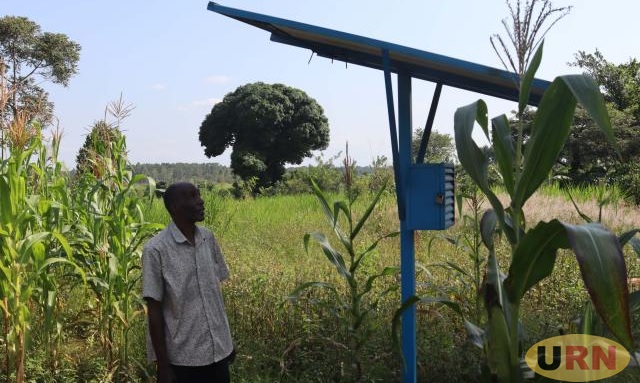
Kampala, Uganda | THE INDEPENDENT | Districts across Uganda are struggling to scale up the uptake of the micro-scale irrigation programme as the deadline for absorbing the World Bank-funded grant approaches. Implemented under the Uganda Intergovernmental Fiscal Transfer (UgIFT) programme, the micro-scale irrigation initiative supports farmers with up to 2.5 acres to purchase and install irrigation equipment.
Depending on the nature of the farm and equipment costs, the government contributes between 25% and 75% of the total cost. Farmers acquiring solar-powered systems, for instance, pay only 25%. Despite its benefits, the programme—launched in the 2021/22 financial year in 40 districts—has seen a slow uptake.
The benefiting districts include Luwero, Nakaseke, Wakiso, Lwengo, Masaka, Mayuge, Mbale, Iganga, Kamuli, Manafwa, Kamwenge, Mubende, Mityana, Kitagwenda, Kyotera, Kalungu, Jinja, Bukomansimbi, Ibanda, and others.
In FY 2021/22, only Shs 20.7 billion out of Shs 49.038 billion disbursed was utilized, representing just 42%. In FY 2022/23, districts achieved only 825 micro-scale irrigation equipment installations against a target of 2,783. The total expenditure stood at Shs 24,920,783,987.
The average unit cost for setting up the irrigation systems was calculated at Shs 30,207,011 per 2.5 acres. In Lyantonde district, LC5 Chairman Fred Muhangi praised the government, saying local farmers had embraced the programme more than in other areas.
In contrast, Luwero district registered only two beneficiaries in 2021/22, 18 in 2022/23, 49 in 2023/24, and 120 in 2024/25. Luwero LC5 Chairman Erastus Kibirango attributed the initial low uptake to the high co-funding costs, which many farmers found prohibitive. To overcome this, the district linked farmers to banks for credit, resulting in a significant increase to 120 beneficiaries in 2024/25.
He, however, revealed that about Shs 700 million was returned to the treasury in 2023/24 due to underutilization. The district has since applied for the funds to be reinstated.
Eddie Zziwa, Chairperson of the Luwero District Production and Natural Resources Committee, noted that farmers who adopted irrigation reported increased year-round production.
Daniel Muyomba, a beneficiary from Kijjukira village in Luwero, said the irrigation system helped him overcome water shortages and maintain steady production. Muyomba, one of the 2024/25 beneficiaries, grows crops including coffee, bananas, maize, and vegetables.
In Lira district, 45 farmers had received irrigation systems by December 2024. However, District Senior Agricultural Engineer Denis Otim Otoo expressed concern over the low adoption rate, citing reluctance among farmers despite climate change-induced reductions in food production.
In Kabale district, Resident District Commissioner Godfrey Nyakahuma said over Shs 300 million was returned to the treasury after farmers failed to apply for the equipment.
In his 2023/24 report, the Auditor General recommended reviewing the programme to ensure it targets smallholder farmers and helps them transition from subsistence to commercial agriculture. He also advised conducting affordability assessments before future rollouts and linking districts to irrigation suppliers for better access to maintenance and repairs.
“The impact assessment revealed positive gains for beneficiaries in income per acre, but disparities in regional impact and farmer participation hindered uniform success. Addressing these challenges through improved targeting, expanded training initiatives, and resolving operational inefficiencies will be crucial for maximizing the programme’s sustainable impact and fostering agricultural transformation,” the report stated. Although all UgIFT projects were originally set to end in FY 2023/24, the programme has since been restructured and extended to December 2025.
****
URN
 The Independent Uganda: You get the Truth we Pay the Price
The Independent Uganda: You get the Truth we Pay the Price



